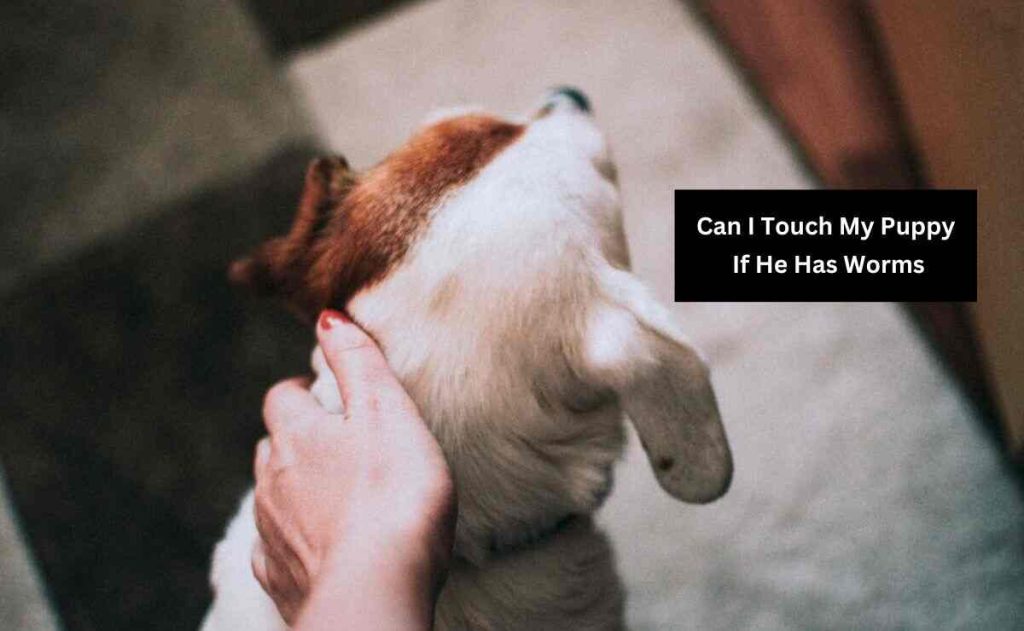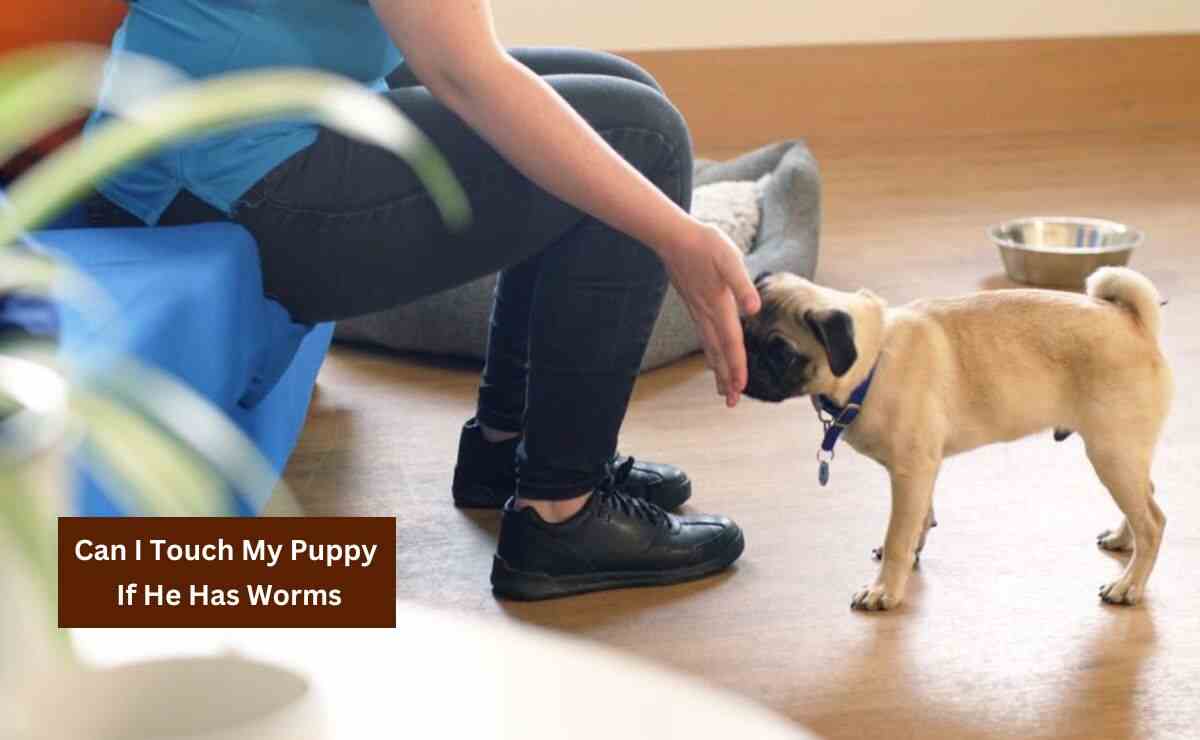You can’t always prevent the creepy worms from growing inside your beloved pet, but you can take precautions for yourself. While worm-infected dogs are a threat to other dogs, they can be a threat to yourself too.
So, if you are wondering, can I touch my puppy if he has worms? The answer is complicated. It’s better to be cautious when your dog is infected by worms. Some worms are contagious, which means they can be passed from animals to people.
You should know what kind of worms your puppy has because different kinds of worms can make your puppy sick. To know more about the preventative measures, let’s move forward!
Can I Touch My Puppy If He Has Worms?

You can touch your puppy if he has worms, but it is not advised to do so. Many worms that can infest dogs are zoonotic, which means they can be passed from animals to people.
Different types of worms can cause different diseases, each with its own signs. So, staying alert is the best way to keep yourself and your pet friend safe.
These zoonotic diseases, also called zoonoses, can be passed from animals to people. That’s why you need to know exactly what kind of worms are affecting your puppy.
Jerry Klein, the AKC’s chief medical officer, highlights that worms can be spread by touching contaminated soil and your dog’s poop. In some cases, worms can spread from dogs to humans too. So, it’s better to be safe than sorry when it comes to touching a worm-infected puppy.
Is It Safe To Be Around A Puppy With Worms?
Zoonotic (zoe-o-NOT-ick) worms can make humans infected by dogs. Therefore, you need to be cautious to be around a puppy with worms. But, if your puppy doesn’t have a zoonotic type of worm, you are safe to be around him.
If you notice changes in your pet’s behavior, hunger, or bowel movements, it could mean that they have worms.
One important thing to remember about prevention is that good cleanliness is a must. Worms can be found in your puppy’s poop and in the surroundings, which could be dangerous for both of you.
When you clean up after your puppy, you not only keep their living space clean, but you also reduce the chance that any worms will spread. Getting your puppy dewormed regularly, as your vet may suggest, is another good way to keep your family and dog safe.
What Precautions Should I Take If My Puppy Has Worms?
Taking prompt and appropriate precautions is essential for both your puppy’s well-being and your own when your puppy has worms. So, here are a few things to do:
- Seeing A Vet: Seeing a vet is the first and most important thing you should do if you think your puppy has worms. Based on your puppy’s age, weight, and health, the vet will suggest the best way to treat it, including the right deworming medicine and dose.
- Isolation And Hygiene: If you don’t want worms to spread to other pets or people in your family, you need to keep your infected baby away from other animals for a while. Set aside a space for them and make sure it stays clean and germ-free. Wash your hands well after playing with or medicating your puppy.
- Sticking To The Deworming Plan: Do not stray from the deworming plan your vet gives you. There is usually more than one dose needed to get rid of all stages of worms during deworming. If you miss doses or stop the treatment too soon, the problem might not go away completely and come back.
- Clean Up The Environment: Worm eggs can live in your puppy’s environment, so it’s important to keep the area where he lives clean. Clean and disinfect your puppy’s beds, toys, and any other places they like to hang out regularly. To stop the spread of worm eggs, get rid of feces right away and in a safe way.
- Preventive Steps For The Future: Once your puppy has finished the deworming process, you should focus on taking steps to make sure that it doesn’t get worms again. Set up regular check-ups with the vet to keep an eye on your puppy’s health. Follow your vet’s advice about how often to deworm your pet.
How Do You Stop Puppy Worms From Spreading?
If you think your puppy has worms or see signs of it, like changes in their stool or being tired, you should make an appointment with your vet right away. Getting help from a vet is the first line of defense.
Once you know that the puppy has worms, it’s time to put it in a cage. Keep the sick puppy away from other pets to stop the disease from spreading. Until then, follow a strict hygiene practice.
After cuddling or giving the puppy medicine, wash your hands very well to avoid spreading the germs. This makes it less likely that worm eggs will get on surfaces or other animals in your home by accident.
Use disinfectants that are safe for pets to clean their beds, toys, and other things they use a lot. Getting rid of feces quickly and safely is important to keep worm eggs from getting into your home.
Cleaning and cleaning the area helps get rid of any worm eggs or larvae that are still there, which is a big part of stopping the infestation from spreading.
By taking preventative steps, you’re actively protecting your puppy and stopping problems related to worms from happening again.
What Happens If I Get Worms From A Dog?
It might sound scary to get worms from a dog. But don’t worry! You can easily get away from this.
Roundworms, hookworms, tapeworms, giardia, and other types of worms can live in dogs. For each type, there are different signs and possible health effects. For the right treatment and care, it’s important to know exactly what kind of worm is involved.
Some of the most common signs that you might have worms from a dog are stomach pain, diarrhea, losing weight, and feeling tired. However, some symptoms may be mild or not present at all in many cases.
If you think your dog gave you worms, you need to seek immediate medical attention. To find out what kind of worm it is and what medicine will work best, diagnostic tests like stool samples may be needed.
The good news is that most cases of worms being passed from dogs to people can be treated. These parasites can be removed from your body by medicines. Also, taking preventative steps is important to avoid getting infections again.
Good cleanliness, like washing your hands often, especially after petting or cleaning up after your dog, can greatly lower the risk of transmission.
Conclusion
Many pet owners worry about- can I touch my puppy if he has worms? As an answer to this, we have given you a lot of things to take into account. It’s necessary to practice proper cleanliness if your dog has worms.
However, don’t get scared, in most of the instances this is not a life-threatening issue and is easily treatable.
